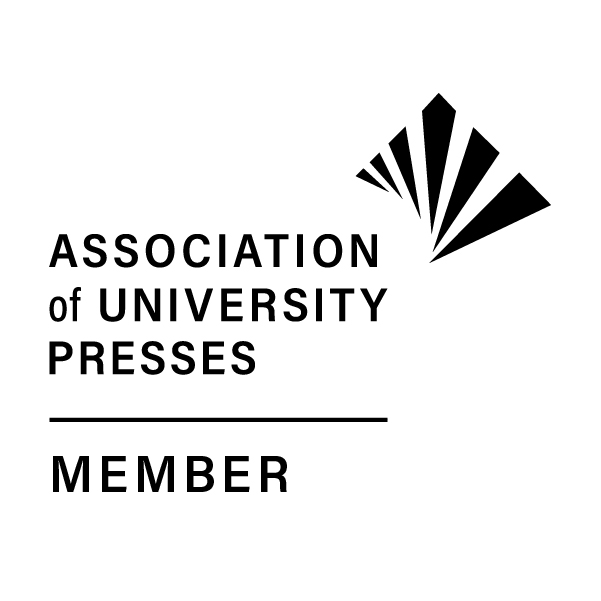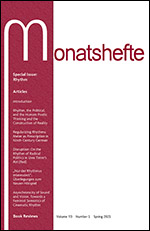|


|

Subscribe
Read the Journal Online
Submission Guidelines
Editorial Board
Receive Email Updates
Advertise in Monatshefte
Indexes/Abstracts
Current Issue TOC
Back Issues TOC
Monatshefte 2022 Subscription Rates
Institutions:
print & online $271
online only $233
Individuals:
print & online $103
online only $86
Non U.S. Postage (no postage charges for online-only subscriptions)
Airmail: add $40/yr.
Canadian Subscribers: add 5% GST. |
Monatshefte
Volume 97, Number 4, Winter 2005 Table of Contents
Articles
Jörn Steigerwald
Stimmgabe: Rhetorische und ästhetische Prosopopeia im Kater Murr
Abstract:
The protagonist of E.T.A. Hoffmann’s novel Lebens-Ansichten des Katers Murr has often been regarded as ‘Bildungsphilister.’ In contrast to this widespread interpretation, I will argue that Murr does not belong to this category but is a self-conscious and self-reflective persona. As a literary figure he is the successor of the Puss-in-Boot tradition; as an autobiographer his way of speaking stands in the tradition of the speech of the fool. By being a cat, Murr refers to his predecessors without being someone’s servant anymore—he acts and speaks only for himself. The autobiographer Murr uses the speech of the fool in order to decompose and to defigurize his writing. This leads to the fact that his discourse is polyphone and non-referentiable. The autobiography is the monument of defigurized speech which presents the individual style of Murr combining romantic authorship and the speech of the fool. This double prosopopeia of Kater Murr personifies the transition from the rhetoric based system of imitation and emulation to the aesthetic based system of style and intertextuality. (JS) (In German)
Christiane Arndt
On the Transgression of Frames in Theodor Storm’s Novella Aquis submersus
Abstract:
In Theodor Storm’s novella Aquis submersus, the frame novella is introduced as an aesthetic form, which displays the principle of immortalization through art. The function of the narrative frame on the textual level is symbolized by actual picture frames in the story, such as the picture of a dead child serving as the Dingsymbol of the novella. The opposition between the dead child and the immortal work of art is overcome by the transgression of the frame, first with respect to the picture frame and ultimately with respect to the narrative frame on the textual level. The boundaries that the frames introduce, such as the distinction between life and death or between past and present, are overcome through and by the emergence of a work of art. In the end, the prevalence of the literary text marks a qualitative distinction between painting and writing as artistic production. (CA)
Rick Chamberlin
Coming Out of His Father’s Closet: Klaus Mann’s Der fromme Tanz as and Anti-Tod in Venedig
Abstract:
In Der fromme Tanz (1925), Klaus Mann creates an anti-Tod in Venedig, thereby affirming what his father Thomas repudiated in himself and in Gustav von Aschenbach: his homosexuality. In this pioneering attempt to map out a gay identity, Mann allows the intersection of personal and literary self-fashioning to function as a locus for the establishment of a cultural identity for gay Weimar Republic youth. An analysis of protagonist Andreas Magnus and of autobiographical sources reveals an antipathetic reading of his father’s novella and a main character who is a polar opposite of Aschenbach. Turning instead to George and Wedekind for inspiration, Mann counters the austere rejection of “Sympathie mit dem Abgrund” with the “Vergottung des Leibes” exemplified in Andreas's unrequited love for Niels. With Andreas as a new Aschenbach, Mann attempts to assert himself against his father by proposing life-affirming consequences of embracing and sublimating homoerotic desire. (RC)
Cornelius Partsch
The Case of Richard Sorge: Secret Operations in the German Past in 1950’s Spy Fiction
Abstract:
By the mid-1950s, the figure of the notorious master spy Richard Sorge had acquired a broad cultural and ideological currency in Germany both in fictional and non-fictional imprints. Through readings of two Sorge novels by Hans-Otto Meissner and Hans Hellmut Kirst, both published in 1955, this article examines the conditions under which a distinctly German spy genre developed and flourished before the ascent of Anglo-American spy films and fiction. Drawing on genre theory and popular culture studies, these exemplary texts are investigated within a variable and historically specific network of intertextual relations and cultural reference. In addressing the changing circumstances of post-war Germany, concerning especially the project of coping with the past and the escalating Cold War tensions between the two German states, the various organizations and reorganizations of the Sorge material furnished well-received, ideologically loaded, and imaginary resolutions of the real historical contradictions of the time. (CP)
Reinhold Grimm
Wissenschaft und Dichtung. Zu Hans Magnus Enzensbergers jüngsten Veröffentlichungen
Abstract:
Arguably, Hans Magnus Enzensberger is the formemost poet of science, or scientific poet, not only in present-day German letters, but in contemporary literature worldwide. His most recent contributions, the essay “Die Poesie der Wissenschaft” (2001/02/03) and the poems of the volume Die Geschichte der Wolken: 99 Meditationen (2003) in particular, testify more than anything else to this towering position. The article reports on Enzensberger’s essay, then discucces his 2003 collection in detail, concentrating on various texts which prove to be especially revealing. Both the author’s poetizing of science, or scientification of poetry, and the article’s mini-interpretations devoted to it culminate in the sovereign appropriation of modern chaos theory by the now seventy-five-year-old. (RG) (In German)
Review Article
B. Venkat Mani
The Self and the Other: Contemporary German Scholarship on Trans-, Inter-, and Multiculturalism
Personalia
Introduction, German Departments in the U.S.A., German Departments in Canada, Promotions, New Appointments, Visitors, Retirements, Necrology, Doctoral Dissertations, Summary
Book Reviews
Berman, Nina, Impossible Missions? German Economic, Military, and Humanitarian Efforts in Aftica (Fatima El-Tayeb)
Blioumi, Aglaia, Interkulturalität als Dynamik. Ein Beitrag zur deutsch-griechischen Migrationsliteratur seit den siebziger Jahren (B. Venkat Mani)
Bussiek, Dagmar, “Mit Gott für König und Vaterland!” Die Neue Preußische Zeitung (Kreuzzeitung) 1848–1892 (Matthias Brosch)
Conter, Claude D., Jenseits der Nation—Das vergessene Europa des 19. Jahrhunderts. Die Geschichte der Inszenierungen und Visionen Europas in Literatur, Geschichte und Politik (Gerhart Hoffmeister)
Docker, John and Gerhard Fischer, eds., Adventures of Identity. European Multicultural Experiences and Perspectives (B. Venkat Mani)
Ette, Ottmar, Literatur in Bewegung. Raum und Dynamik grenzüberschreitenden Schreibens in Europa und Amerika (Josef Schmidt)
Feldbusch, Thorsten, Zwischen Land und Meer. Schreiben auf den Grenzen (Josef Schmidt)
Fohrmann, Jürgen und Helmut J. Schneider, Hrsg., 1848 und das Versprechen der Moderne (Brent Peterson)
Frey, Hans-Jost, Vier Veränderungen über Rhythmus (Antje Krüger)
Frey, Hans-Jost, Wortstellungen zur Stellung der Poesie (Antje Krüger)
Hagenbüchle, Roland, Von der Multi-Kulturalität zur Inter-Kulturalität (B. Venkat Mani)
Honold, Alexander und Oliver Simons, Hrsg., Kolonialismus als Kultur. Literatur, Medien, Wissenschaft in der deutschen Gründerzeit des Fremden (Russell A. Berman)
Jung, Matthias, Thomas Niehr und Karin Böke, Ausländer und Migranten im Spiegel der Presse. Ein diskurshistorisches Wörterbuch zur Einwanderung seit 1945 (B. Venkat Mani)
Komm, Katrin, Das Kaiserreich in Zeitromanen von Hedwig Dohm und Elizabeth von Armim (Helen G. Morris-Keitel)
Kosta, Barbara and Helga Kraft, eds., Writing Against Boundaries: Nationality, Ethnicity and Gender in the German-speaking Context (Helga G. Braunbeck)
Kraus, Hans-Christof, Hrsg., Konservative Zeitschriften zwischen Kaiserreich und Diktatur. Fünf Fallstudien (Matthias Brosch)
Lezzi, Eva und Monika Ehlers, Hrsg., in Zusammenarbeit mit Sandra Schramm, Fremdes Begehren. Transkulturelle Beziehungen in Literatur, Kunst und Medien (B. Venkat Mani)
Lindemann, Uwe, Die Wüste. Terra incognita—Erlebnis—Symbol. Eine Genealogie der abendländischen Wüstenvorstellungen in der Literatur von der Antike bis zur Gegenwart (Stefanie Ohnesorg)
Lindemann, Uwe, Monika Schmitz-Emans und Beate Hofmann, Hrsg., Was ist eine Wüste?—Interdisciplinäre Annäherungen an einen interkulturellen Topos (Stefanie Ohnesorg)
Mücke, Dorothea E. von, The Seduction of the Occult and the Rise of the Fantastic Tale (Birgit Tautz)
Nell, Werner, Reflexionen und Konstruktionen des Fremden in der europäischen Literatur. Literarische und sozialwissenschaftliche Studien zu einer interkulturellen Hermeneutik (B. Venkat Mani)
Perrey, Beate Julia, Schumann’s Dichterliebe and Early Romantic Poetics: Fragmentation of Desire (Rebekah Pryor Paré)
Rommelspacher, Birgit, Anerkennung und Ausgrenzung, Deutschland als multikulturelle Gesellschaft (B. Venkat Mani)
Schmitz-Emans, Monika, Seetiefen und Seelentiefen. Literarische Spiegelungen innerer und äußerer Fremde (Birgit Tautz)
Shafi, Monika, Balancing Acts. Intercultural Encounters in Contemporary German and Austrian Litarature (B. Venkat Mani)
Turk, Horst, Philologische Grenzgänge. Zum Cultural Turn in der Literatur (Hinrich C. Seeba)
Uerlings, Herbert, Karl Hölz und Viktoria Schmidt-Linsenhoff, Hrsg., Das Subjekt und die Anderen. Interkulturalität und Geschlechterdifferenz vom 18. Jahrhundert bis zur Gegenwart (B. Venkat Mani)
Vazsonyi, Nicholas, Wagner’s Meistersinger: Performance, History, Representation (James L. Zychowicz)
Wellbery, David E. and Judith Ryan, eds., A New History of German Literature (Theodore Ziolkowski)
Wierlacher, Alois und Andrea Bogner, Hrsg., Handbuch interkulturelle Germanistik (Bernhard R. Martin)
Index Volume 97 (2005)
|


